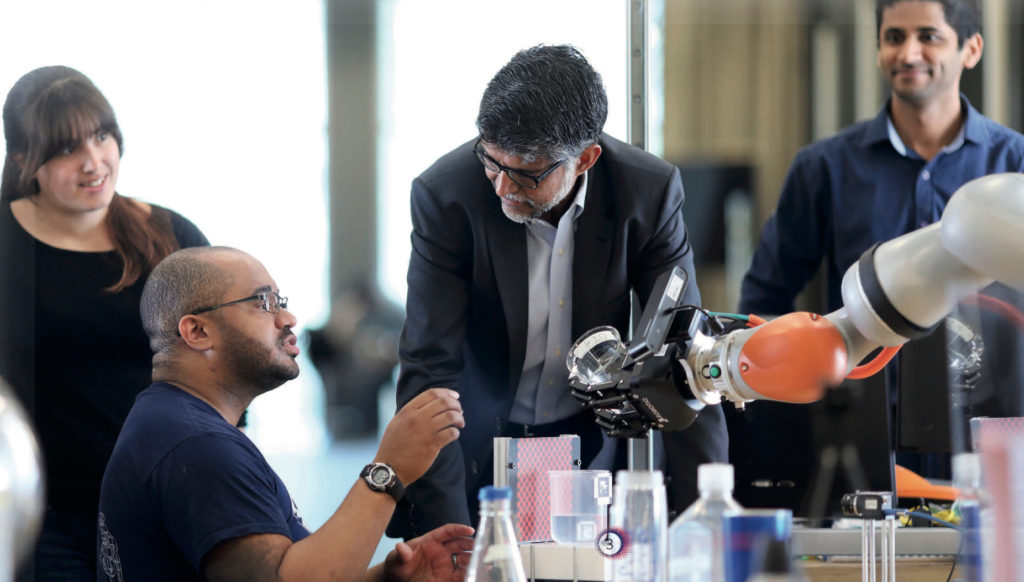
From technology to health care to social science, data is changing the way we see the world.
The ability to extract information from vast amounts of data effectively and responsibly promises new breakthroughs in how we develop innovative technologies, treat patients, and implement policy that affects our society.
To harness that potential, Penn is constructing a new Data Science Building, which will house next-generation classrooms for hybrid learning and state-of-the-art research facilities, creating a hub for scholars and students from disciplines across campus and beyond. Located at 34th and Chestnut Streets, the building will give members of the Penn community access to the tools and technology they need to conduct deep investigations into problems and bring together varied perspectives to better inform those analyses.
A $25 million gift from Harlan M. Stone, C’80, PAR’13—the largest in the history of the School
of Engineering and Applied Science—laid the groundwork for the construction of the building, which was a top priority for the School as part of The Power of Penn Campaign. Stone is the CEO of HMTX Industries, a global flooring manufacturer, and he serves on the Penn Engineering Board of Advisors. He is currently Chair of Penn Engineering’s Academic Life Committee, and he chairs the Penn Engineering Technical Advisory Board. Stone also serves on the Abramson Cancer Center Innovation Advisory Board at Penn Medicine.
Data science allows researchers to build models out of huge quantities of data that would be nearly impossible for humans to decipher without advanced computing techniques, explained Vijay Kumar, the Penn Engineering Nemirovsky Family Dean. “We can take an unbelievable number of measurements, and we can interpret those measurements in ways we never could before. This allows us to develop new models of complex systems which may be too difficult to analyze or design using traditional approaches,” he said.
Thanks to Stone’s generosity, along with gifts from other donors, Penn scholars and students will be able to work together, exchange ideas, and benefit from the cross-pollination of research in this new space. The building will feature hybrid learning classrooms; collaborative spaces for student projects; research centers for new socially aware data science methodologies and bio-inspired paradigms for computing; and laboratories that will develop data-driven, evidence-based solutions for safer and more cost-effective health care.
“Now is the time to put technology to good use,” said Stone.
Stone has a passion for data science, and he understands the power of scholars from different fields coming together from his time at Penn. As an undergraduate, he studied the history of art, particularly the Italian Renaissance, and learned how the exchange of ideas during that time led to astonishing advances in society. “I saw what happens when technology, science, the humanities, religion, and history come together,” said Stone. “Amazing ideas flower in a thousand different ways.”
Stone said when he first became interested in data science, he envisioned emerging computer science helping art historians, anthropologists, and sociologists discover new insights in their fields. These data-driven discoveries certainly do happen; Dean Kumar pointed to a recent example of data scientists collaborating with Shakespeare scholars to determine that Christopher Marlowe was likely a co-author on the Henry VI plays.
But Stone soon realized that it was just as important for data scientists to learn from their peers in other fields. “It’s a two-way street,” he said.
A space like the Data Science Building, which will break ground in 2022, creates the opportunity for other fields to be informed by data, but also to influence how new technologies develop. When the Data Science Building is completed, students from across campus will be able to use the building’s labs and gathering spaces for group projects.
It’s important for students to see engineers working alongside colleagues in medicine, the social sciences, and the humanities, Dean Kumar explained. “Those kinds of spaces are the heart and soul of a campus like Penn’s,” he noted.
These sorts of interdisciplinary inspirations have the potential to reach even further. In an effort to ensure that the next generation of data scientists come into the field with a diverse set of backgrounds and perspectives, new programs at the Data Science Building will provide Philadelphia K-12 students with foundational instruction in computer science. The space
will also allow community members and local industry to interact with Penn students and faculty.
“This is a profound and enlightened opportunity,” Stone added. His generosity and the support
of other Penn donors will give Penn a state-of-the-art space to turn the ideas of its faculty and students into solutions for our most pressing issues.
This article originally appeared in the Spring 2021 edition of The Power of Penn Campaign Magazine.
